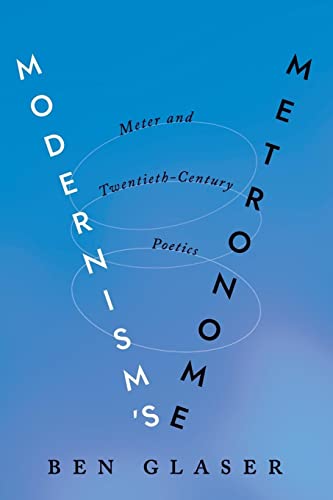Modernism's Metronome
Meter and Twentieth-Century Poetics (Hopkins Studies in Modernism)
Ben Glaser
BOOK REVIEW

In Modernism's Metronome: Meter and Twentieth-Century Poetics, Ben Glaser embarks on an audacious journey through the realms of verse, compelling us to interrogate our understanding of meter in a tumultuous century marked by artistic upheaval. This isn't merely a critical analysis; it's an exploration of rhythm as both a structure and a rebellious act, a heartbeat pulsing beneath the surface of modernist poetry that challenges the very fabric of linguistic expression.
Glaser's work magnifies the rhythmic undercurrents that shaped the voices of legendary poets. He dissects how meter, often viewed as a rigid constraint, becomes a dynamic force of innovation, a catalyst for emotional depth and narrative complexity. In an age where conventional forms of writing were shunned, meter emerged as a radical tool-defying expectations, provoking thought, and encouraging poetic revolutionaries like W.H. Auden, T.S. Eliot, and H.D. (Hilda Doolittle) to reinvent their craft amidst the chaos of war and societal changes.
The historical backdrop of the twentieth century looms large over Glaser's examination. The aftermath of World War I and the seismic shifts in culture and ideology carved pathways for poets willing to experiment with form and structure, allowing meter to evolve into a vehicle for expressing modern anxieties and aspirations. His analysis is a brilliant tapestry woven with threads of historical context, illuminating how the beats of a poem resonate not just on the page but in the very fabric of society. As poetry adapts, so too does humanity grapple with the resulting existential crises of identity and belonging.
Readers who delve into this scholarly piece will find their perceptions of meter transformed. The reception has sparked diverse reactions-some celebrate Glaser's bold propositions, marveling at his ability to breathe life into the often-ignored mechanics of poetry, while others critique his audacity, arguing that he risks losing the essence of traditional forms. Yet herein lies the beauty of Glaser's inquiry: he doesn't shy away from the controversy; instead, he invites discourse, challenging us to rethink our biases and embrace the complexity of poetic structure.
This work doesn't just speak to the academic; it reverberates with anyone captivated by the power of words. It demands that you feel the pounding heartbeat of poetic meter, urging you to confront how it reflects the pulse of the time. What would happen if we allowed ourselves to view meter not as a limitation, but as a freedom? Glaser's exploration evokes profound contemplation, offering a space for readers to interrogate their own relationships with poetry and art.
As the pages unfold, the gate to a broader understanding of twentieth-century poetics swings wide open. The cries of modernism-marked by fragmentation, disillusionment, and a fierce desire for rebirth-echo through Glaser's analysis, resonantly reminding us that meter isn't a relic of the past, but a vibrant element that can engage and enthrall. The book doesn't just satisfy the need for intellectual stimulation; it incites a hunger for the poetic, a yearning to unearth the layers that lie beneath written language.
By the end, one cannot escape the almost magnetic pull of Glaser's assertions. He has crafted a work that is more than just a study; it is a clarion call to artists, poets, and thinkers alike to acknowledge the metronome of modernism as a vibrant force, a melodic underpinning that pulses with the energy of a century defined by transformation. This is not just a scholarly review; it is an invitation to be part of a larger conversation-one that refuses to let meter be a mere footnote in the story of poetry. Don't miss this chance to redefine your understanding of an art form that has shaped cultures and continues to redefine itself.
📖 Modernism's Metronome: Meter and Twentieth-Century Poetics (Hopkins Studies in Modernism)
✍ by Ben Glaser
🧾 304 pages
2020
#modernisms #metronome #meter #twentieth #century #poetics #hopkins #studies #modernism #glaser #BenGlaser